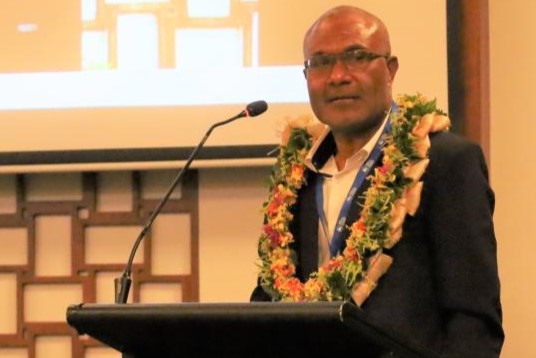Following three days of meetings, Pacific Island Attorney Generals representing Fiji, Kiribati, Papua New Guinea, Tuvalu and Vanuatu issued a joint statement today underscoring the Pacific Island states’ unique position as the only region where all United Nations member states are actively participating in the International Court of Justice (ICJ) climate advisory opinion proceedings.
Oral hearings are set to begin on 02 December 2024. This historic collaboration represents the Pacific’s collective commitment to addressing the existential threat posed by climate change through international law.
The ICJ case, initiated by Vanuatu, seeks to clarify the legal obligations of states to combat climate change and protect vulnerable communities. For decades, Pacific Island states have experienced the devastating impacts of climate change, including increasingly severe cyclones, rising sea levels, and land degradation. These disasters have displaced communities, threatened livelihoods, and eroded local economies. Cyclones like Harold and Pam, which devastated the region in recent years, serve as distressing reminders of the urgency for global climate action.
Vanuatu, which has been instrumental in driving this case, views the ICJ proceedings as a critical moment for climate justice and accountability.
Vanuatu’s Attorney General, Arnold Kiel Loughman, remarked: “Vanuatu’s initiative to bring climate change before the ICJ was born out of necessity. For too long, our region has withstood the brunt of climate impacts while contributing the least to the crisis. The collective voice of Pacific Island states in the upcoming proceedings is a critical step in safeguarding our people and preserving our cultures. The effects of climate change are not just disasters. They are wake-up calls to recognise the link between climate change and human rights violations in order to drive states to act on behalf of the most vulnerable.”
Fiji’s Attorney General, Graham Leung, reflected on the importance of global cooperation: “The ICJ advisory opinion offers a unique opportunity to clarify what international law requires of States to address and mitigate the impacts of climate change. For many of us, this is not simply a legal issue—it is a matter of survival. The effects of climate change are already upon us, and we have a duty to ensure that the legal framework governing this crisis is as robust, clear, and enforceable as possible. Fiji is committed to working with our Pacific friends at the ICJ hearing in December to support our joint efforts for climate change justice.”
Kiribati’s Attorney General, Pauline Beiatau, stressed the urgency of climate action: “Kiribati has long been on the frontline of the climate crisis, and the time to act is now. With sea temperature rises, storm surges and high winds, erosion, drought and flooding, and climate changes that are exacerbating Kiribati’s high burden of disease, the continued existence of our islands are already threatened. The actions we take today will define the future for generations to come. We cannot afford to wait.”
Papua New Guinea’s Attorney General, Pila Kole Niningi, added: “PNG stands in solidarity with our Pacific neighbours as we present a unified fight against the climate crisis. Climate action in the Pacific is about survival, of our environment, peoples and cultures, and addressing climate change demands sustained, long-term commitment. This historic case before the ICJ is an opportunity to provide a global compass, guiding nations toward real action, accountability, and justice in addressing the climate emergency.”
Tuvalu’s Attorney General, Laingane Italeli Talia, echoed the concerns of small island nations: “Tuvalu’s very existence is under threat, along with other Island states, and collective action is our strongest tool against the climate crisis. The ICJ advisory opinion could become a defining moment in international law – setting new precedents for climate justice, human rights protection, and holding polluters accountable for their contributions to the climate crisis, said Talia.














